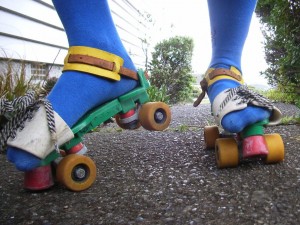Transport Yourself
 Weds 22 Sept was World Car-free day. As a kid, I was lucky enough to live over the road from my suburban primary school (I do believe I even crossed the road alone) and cycled with a buddy to my high school about 5kms away. The latter was as recently as the early-90’s. The worst harm that ever came to me was a grazed knee from falling off whilst taking a corner, no hands, at speed (lesson learnt).
Weds 22 Sept was World Car-free day. As a kid, I was lucky enough to live over the road from my suburban primary school (I do believe I even crossed the road alone) and cycled with a buddy to my high school about 5kms away. The latter was as recently as the early-90’s. The worst harm that ever came to me was a grazed knee from falling off whilst taking a corner, no hands, at speed (lesson learnt).
These days I have to restrain myself from applauding if I see parents walking their kids to the local school – it’s such a rare and admirable sight.
Personal transport is costing us mega tonnes in carbon emissions and feeding a very unsustainable addiction – to the car. After years of successfully squashing the electric vehicle revolution the big car-makers may now be on the verge of giving in to public demand, and the irrevocable reality of climate change and its (pardon the pun) drivers.
Of course there are some fairly low-tech alternative transport options – like feet. A colleague of mine, if asked how she’ll get to a destination, often points downwards and says “I’ll use these.” Bicycles also work for some people.
But more and more, for many people, the pressures of time, a groomed appearance, baggage and responsibility to transport others means neither walking nor biking will cut it as a personal transport solution.
Cars will be with us for a good while yet. We’re not going to give up all that privacy and convenience without a comparable alternative. But all across the world – and in New Zealand in particular – greenhouse gas emissions from the fossil fuels burned directly by road vehicles are a major issue.
That’s why the renewed interest in developing fully electric vehicles (EVs) is such good news.
Nissan’s new Leaf will be for sale at least in the US and UK by the end of this year and General Motor’s Chevrolet Volt is at show-room stage. And  these are no strange little one-man bubble-cars. They are ‘real cars’: 5-door, 100+km range and 150km/h if you like that sort of thing.
these are no strange little one-man bubble-cars. They are ‘real cars’: 5-door, 100+km range and 150km/h if you like that sort of thing.
But both these cars, like Toyota’s highly successful hybrid Prius, come at a premium price – recent research by Nielsen reported in the Financial Times indicates that while many people are willing to buy them, they aren’t willing to pay the upfront cost despite the kick backs in fuel savings and environmental benefits. Government subsidies for electric cars are a good incentive – UK buyers can get about £5,000 towards the cost of an EV. Here in NZ, the government offer is somewhat less generous – they knock off the road user tax (about 4 cents per kilometre) for EV owners. The total cost of this scheme to the treasury by the time it ends in 2013 will be a tiny $105,000.
So we must seek practical, cost-effective emissions-free transport elsewhere.
As a cyclist in Wellington I am quite taken by the notion of the electric bike. Imagine, arriving at a meeting not sweaty!
There are some on the market that “look and feel just like a normal bike” with the option to either self-peddle or wind up the throttle when the going gets tough. Price-wise they are surprisingly competitive to a ‘normal bike’ – $2,000 – $3,000. You could easily pay double that for something you have to power yourself. The downside comes when you try to carry the thing – 20-odd kilos – up your front steps.
The niftiest personal transport invention to come on the scene recently is the Kiwi YikeBike. So nifty it made the cover of Time and was listed as one of that magazine’s best inventions of 2009.
To look at, the Yike design is very un-bike-like – unless you’re thinking penny-farthing. Compared to the traditional electric bike it’s a featherweight 9 kilos. And it folds up to a pod-like parcel making it perfect to combine with public transport.
In fact, owner/inventor Grant Ryan actually claims the YikeBike is “greener” than the traditional peddle-powered version. Why? Because our personal ecological footprint increases as we eat more to replace energy expended in the riding. But of course the Yike is not trying to out-compete the humble bike – its offering an alternative to some of the car journeys we seem to find it so hard to give up.
While dyed in the wool car drivers may be looking askance at a future roadscape of electric vehicles (or elctric bikes for that matter), try this vision on for size: the Chinese (who else) have designed a giant bus that straddles whole lanes of traffic. In the future these uber-buses could reduce traffic congestion (and possibly bus-rage), reduce emissions, carry hundreds of passengers and cost less than an underground railway to build.
In the meantime, the least we can do is take head of such practical experiments as EECA’s Energy Wise rally coming up in October – the biennial quest to find NZ’s most fuel efficient vehicle, and driver.
If you must drive something, its becoming cooler to boast about how many kilometres per litre you can get rather than how many horsepower you’ve got under the hood.
That means we’re giving the motor industry all the right signals to ramp up production of EVs and drive the cost down. In the meantime, try using your feet for a day – they’re a remarkably efficient and cost-effective personal transport invention. Combined with trains and buses, these can get you pretty much anywhere you need to go.
loading...
loading...
Tags: green design, transport



You know how people joke about ‘returning to the horse and cart?’
Actually I think that’s quite a good idea, I’m talking small scale, and in a stylish kind of way. Can you imagine the possibilities around robust cart design? I can see big, light, rough terrain tyres for bumpy terrain, or lighter, slimmer ones (all made from recycled materials of course) for suburban driving. I’m thinking ‘all weather options’ in cart design. I can see people collecting the poo for their gardens (rather proudly. Ahhh just imagine …
loading...
loading...
Now that is an ACE idea! So long as the hourses are into it. Mind you i had a job once clearing up horse poo behind a pony and trap ride at a Christmas fair. I now understand the idea of those little bags that hang under their tails. But how fantastic – the “pollution” from that transport is actually glorious fertiliser!
loading...
loading...